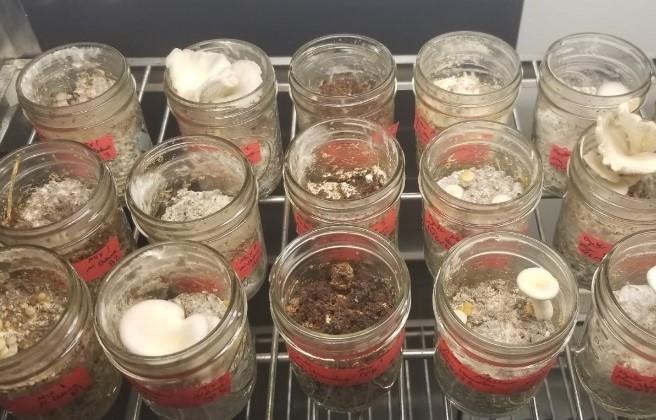By Jordan Strickler
Mushrooms and distilleries have quite a bit in common thanks to students at the University of Kentucky College of Agriculture, Food and Environment. With funding from the UK Office of Sustainability, a group in the Department of Biosystems and Agricultural Engineering, and the Department of Horticulture, is looking for ways to raise fungi using spent grains from local distilleries.

Distilleries' spent grains have turned out to be a great way to raise fungi.
Zachary Byrd, lab manager on the project, graduated in August with a master’s degree in integrated plant and soil science. He said distilleries look to cattle producers as the main users of their spent grains.
“However, cattle farmers cannot keep up with a booming bourbon industry that is producing more bourbon, and consequently more waste, than ever before,” Byrd said. “You can’t just dump these grains on the ground, so this has turned into a very large issue."
Spent grain is what is left over after distilleries make whiskey and other spirits.
“In a distillery, grains like corn, malted barley, wheat and rye are mashed to produce a sugary liquid that yeast ferment into ethanol,” explained assistant BAE professor Tyler Barzee. “The liquid is then passed through a still to recover the ethanol which is then poured into barrels and aged into a whiskey product. The leftover liquid, also known as ‘stillage’, contains all the same grains you started with but since the fermentable sugars have been removed, the leftover grains are then considered ‘spent’.”
UK sits in the heart of bourbon country, so spent grains are quite prevalent. While other uses, such as cattle feed, have been established to deal with these grains, that avenue is only so large. UK CAFE students found that spent grains are excellent for growing mushrooms, coined “Bourbon Shrooms” by Barzee, Byrd, Norbert Bokros, Virginia Verges, a post-doctorate scholar in the UK Department of Horticulture, and Seth DeBolt, professor of Horticulture and Director of the James B. Beam Institute for Kentucky Spirits.
“We started formulating this idea that another great use for these spent grains was working in microbiology with fungi,” Byrd said. “That led us down this road where now the end goal is to grow mushrooms on spent grains. We believe it will be a help to mushroom producers, distilleries and the community.”
The group is currently concentrating on oyster mushrooms as they are fast-growing, hardy and easily fruit. They are also well-suited for small-scale production in Kentucky. At some point, the researchers hope to include lion’s mane and shiitake mushrooms in their studies.
“Ideally, we would want to expand even more, but those three are the ones that we were really basing a lot of this experimentation off of when we started the project,” said Bokros, who is working on a Ph.D. in integrated plant and soil science. “Lion’s mane and shiitake mushrooms are where farmers could profit most since consumers are most familiar with those types.”
Kentucky mushroom growers have successfully sold their products at different venues for years. Farmers’ markets, specialty stores and upscale dining establishments as well as on-farm stands and community-supported agriculture programs are the largest feasible?direct markets. However, the researchers see higher economic potential in the partnership.
“Economic impacts could be significant since stillage is normally given away for free or disposed of at a significant cost to the distillery,” Barzee said. “The types of mushrooms we are growing are considered gourmet and can sell for $15-25 per pound, or more, depending on the mushroom. It’s a niche market right now but in my mind, the partnership with Kentucky distilleries could be a significant advantage to the branding and marketing.”
Source : uky.edu